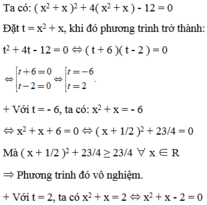giải pt sau\
(x2+x)2+4(x2+x)=12
Hãy nhập câu hỏi của bạn vào đây, nếu là tài khoản VIP, bạn sẽ được ưu tiên trả lời.


\(\left(x^2+x\right)-4\left(x^2+x\right)=12\)
\(\Leftrightarrow x^2+x-4x^2-4x-12=0\)
\(\Leftrightarrow-3x^2-3x-12=0\)
\(\Leftrightarrow x^2+x+4=0\)
\(\Leftrightarrow\left(x^2+2.\dfrac{1}{2}x+\dfrac{1}{4}\right)+\dfrac{15}{4}=0\)
\(\Leftrightarrow\left(x+\dfrac{1}{2}\right)^2+\dfrac{15}{4}=0\) (vô lí)
-Vậy S=∅

\(1,\\ a,ĐK:m\ne1\\ \Delta=49+48\left(m-1\right)=48m+1\\ \text{PT vô nghiệm }\Leftrightarrow48m+1< 0\Leftrightarrow m< -\dfrac{1}{48}\\ \text{PT có nghiệm kép }\Leftrightarrow48m+1=0\Leftrightarrow m=-\dfrac{1}{48}\\ \text{PT có 2 nghiệm phân biệt }\Leftrightarrow48m+1>0\Leftrightarrow m>-\dfrac{1}{48};m\ne1\)
\(b,\Delta=4\left(m-1\right)^2+4\left(2m+1\right)=4m^2+8>0,\forall m\\ \text{Vậy PT có 2 nghiệm phân biệt với mọi m}\\ 2,\\ \text{PT có 2 nghiệm phân biệt }\)
\(\Leftrightarrow\Delta=4\left(m+1\right)^2-4\left(m^2-1\right)>0\\ \Leftrightarrow4m^2+8m+4-4m^2+4>0\\ \Leftrightarrow8m+8>0\\ \Leftrightarrow m>-1\)

1) Thay m=1 vào phương trình, ta được:
\(x^2-2x+1=0\)
\(\Leftrightarrow\left(x-1\right)^2=0\)
\(\Leftrightarrow x-1=0\)
hay x=1
Vậy: Khi m=1 thì phương trình có nghiệm duy nhất là x=1
1) Bạn tự làm
2) Ta có: \(\Delta'=\left(m-1\right)^2\ge0\)
\(\Rightarrow\) Phương trình luôn có 2 nghiệm
Theo Vi-ét, ta có: \(\left\{{}\begin{matrix}x_1+x_2=2m\\x_1x_2=2m-1\end{matrix}\right.\)
a) Ta có: \(x_1+x_2=-1\) \(\Rightarrow2m=-1\) \(\Leftrightarrow m=-\dfrac{1}{2}\)
Vậy ...
b) Ta có: \(x_1^2+x_2^2=13\) \(\Rightarrow\left(x_1+x_2\right)^2-2x_1x_2=13\)
\(\Rightarrow4m^2-4m-11=0\) \(\Leftrightarrow m=\dfrac{1\pm\sqrt{13}}{2}\)
Vậy ...

\(2\left(x^2-x\right)-x\left(x+2\right)+4=0\)
\(\Leftrightarrow2x^2-2x-x^2-2x+4=0\)
\(\Leftrightarrow x^2-4x+4=0\)
\(\Leftrightarrow\left(x-2\right)^2=0\)
\(\Leftrightarrow x-2=0\)
\(\Leftrightarrow x=2\)
Vậy \(S=\left\{2\right\}\)


⇔ ( x + 2 )( x - 1 ) = 0 ⇔ 
Vậy phương trình có tập nghiệm là S = { - 2;1 }.

a/ Thay m = 1 vào pt ta được: x2 + 2 = 0 => x2 = -2 => pt vô nghiệm
b/ Theo Vi-ét ta được: \(\begin{cases}x_1+x_2=2m-2\\x_1.x_2=m+1\end{cases}\)
\(\frac{x_1}{x_2}+\frac{x_2}{x_1}=4\) \(\Leftrightarrow\frac{x_1^2+x_2^2}{x_1x_2}=4\) \(\Leftrightarrow\frac{\left(x_1+x_2\right)^2-2x_1x_2}{x_1x_2}=4\) \(\Leftrightarrow\frac{\left(2m-2\right)^2-2\left(m+1\right)}{m+1}=4\) \(\Leftrightarrow\frac{4m^2-8m+4-2m-2}{m+1}=4\) \(\Leftrightarrow4m^2-10m+2=4m+4\) \(\Leftrightarrow4m^2-14m-2=0\)
Giải denta ra ta được 2 nghiệm: \(\begin{cases}x_1=\frac{7+\sqrt{57}}{4}\\x_2=\frac{7-\sqrt{57}}{4}\end{cases}\)
Khi m=1 ta có : \(x^2-2=0\Leftrightarrow x=\pm\sqrt{2}\)
Pt 2 nghiệm x1 ; x2 thỏa mãn : \(\frac{x_1}{x_2}+\frac{x_2}{x_1}=4\) \(\Leftrightarrow\frac{x_1^2+x_2^2}{x_1+x_2}=4\Leftrightarrow\frac{x_1^2+x_2^2-2x_1x_2+2x_1x_2}{x_1+x_2}=4\) \(\Leftrightarrow\frac{\left(x_1+x_2\right)^2-2x_1x_2}{x_1+x_2}=4\) (1)
Theo viet ta có: \(x_1x_2=\frac{c}{a}=\left(m+1\right)\); \(x_1+x_2=\frac{-b}{a}=2\left(m+1\right)\)
Thay vài (1) ta có: \(\frac{\left[2\left(m+1\right)\right]^2-2\left(m-1\right)}{2\left(m+1\right)}=4\) \(\Leftrightarrow4\left(m^2+2m+1\right)-2m+1=8\left(m+1\right)\Leftrightarrow4m^2+6m+5-8m-8=0\) \(\Leftrightarrow4m^2-2m-3=0\Leftrightarrow\left[\begin{array}{nghiempt}m=\frac{1+\sqrt{13}}{4}\\m=\frac{1-\sqrt{13}}{4}\end{array}\right.\)

8.4/ Để phương trình có 2 nghiệm phân biệt thì \(\Delta'=\left(m+5\right)^2-\left(m^2+6\right)=10m+19>0\Leftrightarrow x>-\frac{19}{10}\)
Theo định lý viete, ta có: \(\left\{{}\begin{matrix}x_1+x_2=-2\left(m+5\right)\\x_1x_2=m^2+6>0\forall x\in R\end{matrix}\right.\)
Ta có: \(\left|x_1\right|+\left|x_2\right|=16\Leftrightarrow x_1^2+x^2_2+2\left|x_1x_2\right|=256\Leftrightarrow\left(x_1+x_2\right)=256\)
\(\Leftrightarrow-2\left(m+5\right)=256\Leftrightarrow m+5=-128\Leftrightarrow m=-133\) (không t/m)
Vậy khôn tồn tại m thõa mãn ycbt
8.3/ Để phương trình có 2 nghiệm phân biệt thì \(\Delta'=\left(m-4\right)^2-\left(m^2+7\right)=-8m+9>0\) \(\Leftrightarrow m< \frac{9}{8}\)
Theo định lý \(viete:\left\{{}\begin{matrix}x_1+x_2=2\left(m+4\right)\\x_1x_2=m^2+7>0\forall x\in R\end{matrix}\right.\)
Ta có: \(\left|x_1\right|+\left|x_2\right|=12\Leftrightarrow x_1^2+x^2_2+2\left|x_1x_2\right|=144\)
\(\Leftrightarrow\left(x_1+x_2\right)^2-2x_1x_2+2x_1x_2=\left(x_1+x_2\right)=144\)
\(\Leftrightarrow2\left(m+4\right)=144\Leftrightarrow m+4=72\Leftrightarrow m=68\) (T/m)
KL: ...........

Bài 1)1)\(x^2+5x+6=x^2+3x+2x+6\)=0
=x(x+3)+2(x+3)=(x+2)(x+3)=0
Dễ rồi
2)\(x^2-x-6=0=x^2-3x+2x-6=0\)
=x(x-3)+2(x-3)=0
=(x+2)(x-3)=0
Dễ rồi
3)Phương trình tương đương:\(\left(x^2+1\right)\left(x+2\right)^2=0\)
Vì \(x^2+1>0\)
=>\(\left(x+2\right)^2=0\)
Dễ rồi
4)Phương trình tương đương\(x^2\left(x+1\right)+\left(x+1\right)\)=0
=> \(\left(x^2+1\right)\left(x+1\right)=0Vì\) \(x^2+1>0\)
=>x+1=0
=>..................
5)\(x^2-7x+6=x^2-6x-x+6\) =0
=x(x-6)-(x-6)=0
=(x-1)(x-6)=0
=>.....
6)\(2x^2-3x-5=2x^2+2x-5x-5\)=0
=2x(x+1)-5(x+1)=0
=(2x-5)(x+1)=0
7)\(x^2-3x+4x-12\)=x(x-3)+4(x-3)=(x+4)(x-3)=0
Dễ rồi
Nghỉ đã hôm sau làm mệt
Đặt \(x^2+x=t\) thì pt thành
\(t^2+4t=12\Rightarrow t^2+4t-12=0\)
\(\Rightarrow t^2-2t+6t-12=0\)
\(\Rightarrow t\left(t-2\right)+6\left(t-2\right)=0\)
\(\Rightarrow\left(t-2\right)\left(t+6\right)=0\)
\(\Rightarrow\orbr{\begin{cases}t-2=0\\t+6=0\end{cases}}\)\(\Rightarrow\orbr{\begin{cases}t=2\\t=-6\end{cases}}\)
\(\Rightarrow\orbr{\begin{cases}x^2+x=2\\x^2+x=-6\end{cases}}\)\(\Rightarrow\orbr{\begin{cases}\left(x-1\right)\left(x+2\right)=0\\x^2+x+\frac{1}{4}+\frac{23}{4}=0\end{cases}}\)
\(\Rightarrow\orbr{\begin{cases}x=1;x=-2\\\left(x+\frac{1}{2}\right)^2+\frac{23}{4}>0\left(loai.\right)\end{cases}}\)
(x2 + x)2 + 4(x2 + x) = 12
<=> x4 + 2x3 + x2 + 4x2 + 4x = 12
<=> x4 + 2x3 + 5x2 + 4x - 12 = 0
<=> x4 - x3 + 3x3 - 3x2 + 8x2 - 8x + 12x - 12 = 0
<=> x3(x - 1) + 3x2(x - 1) + 8x(x - 1) + 12(x - 1) = 0
<=> (x - 1)(x3 + 3x2 + 8x + 12) = 0
<=> (x - 1)(x3 + 2x2 + x2 + 2x + 6x + 12) = 0
<=> (x - 1)[x2(x + 2) + x(x + 2) + 6(x + 2)] = 0
<=> (x - 1)(x + 2)(x2 + x + 6) = 0
<=> (x - 1)(x + 2)[(x2 + 2x\(\frac{1}{2}\)+ \(\frac{1}{4}\)) + \(\frac{23}{4}\)] = 0
<=> (x - 1)(x + 2)[(x + \(\frac{1}{2}\))2 + \(\frac{23}{4}\)] = 0
<=> x - 1 = 0 hay x + 2 = 0 (vì (x + \(\frac{1}{2}\))2 + \(\frac{23}{4}\)> 0)
<=> x = 1 I <=> x = -2